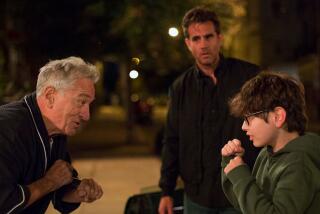After 20 Years, ‘Best Man’ Brings Family Back Together
- Share via
In the mid-’70s young New York filmmaker Ira Wohl began to wonder what would happen to his mentally retarded cousin Philly when Philly’s parents were no longer around to take care of him. When Wohl learned a new facility for the mentally challenged would soon be opening near their Queens apartment, he began encouraging them to plan for their 50-year-old son’s future.
Wohl was inspired to make an irresistibly moving documentary on Philly, “Best Boy,” that won a 1979 Oscar. Now Wohl has brought us up to date with his cousin and his relatives with the no less touching “Best Man: ‘Best Boy’ and All of Us 20 Years Later.”
Except for an arthritic limp, Philly, a polite and appreciative man of childlike innocence and joy, is doing very well, living at the same facility, which he entered after the death of his father and less than a year before the loss of his mother. Until he went off to a day-care center in preparation for moving to the facility permanently, Philly had never gone anywhere unaccompanied by family--not even to the end of the block where he lived.
Having moved to Los Angeles and become a psychotherapist, Wohl began to feel he was losing touch with his relatives. His desire to reconnect with family led to this sequel.
Over the years in sheltered care, Philly, whose infectious personality lights up the screen, has flourished. When Wohl discovered Philly was attending a class in Jewish heritage at the 92nd Street YMHA in Manhattan, he thought it would be wonderful if Philly could mark his upcoming 70th birthday with a bar mitzvah. And, as Wohl remarks, “It would be an occasion for bringing together what’s left of our family one last time.”
If “Best Man” makes a fine case for ensuring that the mentally challenged get the opportunities to lead the most fulfilling, participatory lives possible for them, it is also a celebration of family, in particular the extended family that in recent decades in so many instances has all but withered away.
At the core of “Best Man” is Philly’s loving relationship with his older sister Frances, and indeed this film is as much about this immensely likable woman as it is about Philly. We should all be so lucky to have a sister like Frances, a caring woman of warmth, strength and wisdom. A widowed grandmother who misses her late husband profoundly but says, “You make the best of it,” Frances Weiss lives near her brother in an inviting, sunny garden apartment, where Philly visits every other weekend. Frances checks in on Philly often, and as Wohl considers his cousin he realizes that she has willingly devoted a good portion of her life to her brother’s welfare. He realizes too that she is now nearing the age her mother was when he made “Best Boy,” and Wohl tells her that it is time they make sure he becomes Philly’s legal guardian should anything happen to her.
Wohl tells us about Philly and Frances and his family and friends with the same unpretentious naturalness that he brought to his first film. His is the art that disguises itself; Wohl, rejoined with his small “Best Boy” crew, makes “Best Man” seem as effortless and spontaneous as a home movie, but in reality its planning must have been extensive. “Best Man” is at last--but not all in the least--also a celebration of the enduring value of religion as a source of meaning, connection and continuity in our lives.
* Unrated. Times guidelines: suitable for all ages.
‘Best Man: “Best Boy” and All of Us 20 Years Later’
A Cinemax Reel Life Documentary release of an Only Child Motion Pictures production. Writer-director-producer-editor Ira Wohl. Cinematographer Tom McDonough. Production designer Tony Corbett. Sound Peter Miller. Running time: 1 hour, 29 minutes.
Exclusively at the Grande 4-Plex for one week, 345 S. Figueroa St., downtown Los Angeles, (213) 617-0268.
More to Read
Only good movies
Get the Indie Focus newsletter, Mark Olsen's weekly guide to the world of cinema.
You may occasionally receive promotional content from the Los Angeles Times.










